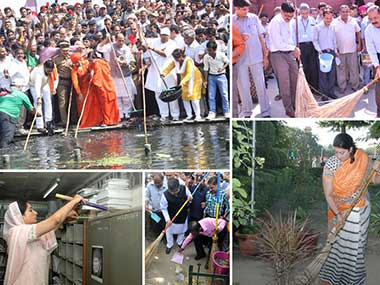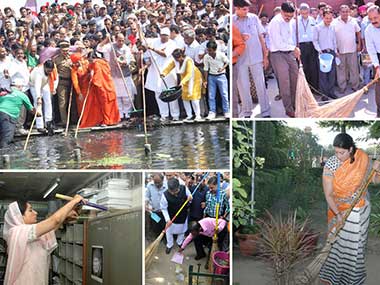The Swachh Bharat Abhiyan, aimed at realising the thought that cleanliness is next to godliness, is a wonderful idea. It even hopes to enlist about three million people among government employees, teachers, and students, to keep the momentum going. For a mass movement, it needs to do a little better than that. How about enlisting the remaining 1,250 million people in the country? The need has never been greater considering the vast amounts of garbage being generated in India’s cities. The problem isn’t new. It was most famously articulated by one Katherine Mayo in her book Mother India, a work that offended the Mahatma, who promptly called it a drainage inspector’s report. Now the Mo-man has made a go of it with his broom sweeping. The Mahatma with his spinning wheel and the Mo-man with his broom. There is a neat symmetry here. In the process, he has even appropriated the election symbol of those gadflies in the Aam Aadmi Party, though they don’t seem to have noticed it so far. There is a difference, however, in the model of brooms used. The Mo-man’s is a heavier duty two handed model, the sort street sweepers use, as opposed to the AAP’s, which is the one-handed kind. Arvind Kejriwal hasn’t launched a fit as yet. He’s more bothered about his movement’s implosion to think about symbol appropriations.  But the Swachh movement still needs a crucial tie-in to become a mass movement. Why? Because, Indians’ lack of civic sense is legendary. One notes the extreme contrast between the inner cleanliness of even the most humble house or hovel, and the mess in the street outside. Somehow this gap between the cleanliness of the inner sanctum of the home, and the world just outside it is highest in India. Clean up the house but then throw everything on the road outside. The problem is compounded by the fact that there’s no place outside to put the garbage. Having a Swachh bin on every street corner in the country might, therefore, be a good beginning. Removing the excise duty on heavy duty garbage bags, and then subsidising them, might also not be a bad idea. But there real key to the Swachh campaign is elsewhere. It lies in enlarging that inner space that people occupy, and are responsible for, to the immediate outside. This is the immediate environment in front of that inner space. So enlarge the inner space to the immediate outer space. If people accept responsibility just for the area of the sadak outside their homes and shops and offices, that’s a hugh leap forward. If everybody does the same, the country gets cleaned up. For this, Modi needs the Gita’s help. There is great spiritual danger, the Gita tells us, in doing someone else’s duty. Just do your own. It is better to do one’s own duty imperfectly, than to do someone else’s duty perfectly. Even dying while performing one’s own duty is superior to the consequence of following someone else’s duty. So just take care of the area immediately outside your house or shop. That’s your duty. Don’t bother about the rest of the neighbourhood, or the city. That’s someone else’s job, and bothering about it will bring spiritual danger to you. Don’t even bother about those big numbers those tedious columnists – including this one - keep writing about. After all, they’re only doing their job. So let them do their job. Don’t even bother about the big picture, or the rest of the country either. That’s Prakash Javadekar’s job. Don’t bother about keeping the rest clean. Just keep that little patch in front of your home or office or shop clean. If anybody attempts to do anything more than keeping their immediate environment clean, inform them of the great spiritual dangers in doing someone else’s duty. Just tell them to do their own duty. If everybody follows that rule, the country gets clean. Adil Rustomjee is an investment adviser in Mumbai. Comments are welcome at a_ rustomjee@hotmail.com.
The Indian psyche of keeping one’s home clean but dumping the garbage outside has been the bane of civic life. Maybe, the Gita’s exhortation to do one’s duty and not bothering about someone else’s duty could help here
Advertisement
End of Article
Written by Adil Rustomjee
Adil Rustomjee is an investment advisor in Mumbai. Sensible comments are welcome at a_rustomjee@hotmail.com see more


)

)
)
)
)
)
)
)
)



